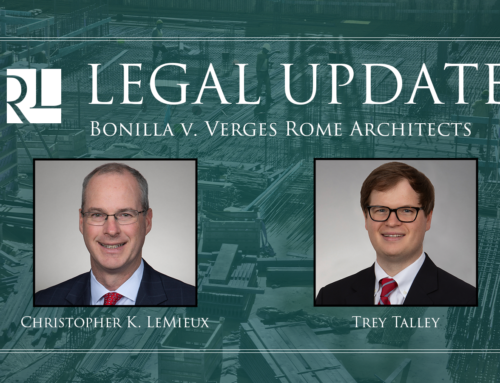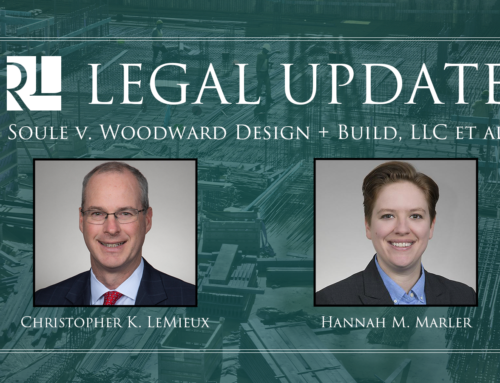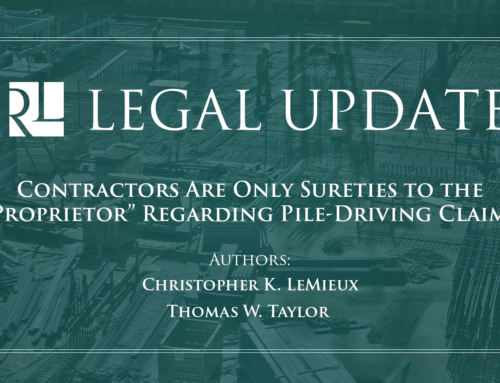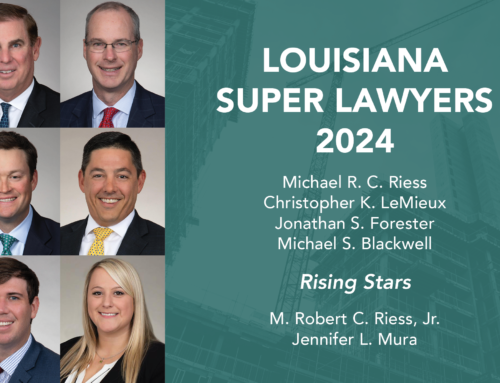Mark Doyle Construction, LLC v. DVR LA2, LLC, and DVR Shreveport, LLC, 324 So.3d 226, (La. App. 2 Cir. 2021).
 Authors: Liz Lambert and Robyn Brown
Authors: Liz Lambert and Robyn Brown
Contractor Waived Right to Payment As a Result of Integration Clause in Contract
In April 2017, DVR LA 2 LLC and DVR Shreveport, LLC (“Collectively DVR) contracted with Mark Doyle Construction, LLC (“Doyle”) to make improvements to a parking lot area, including land clearing, site preparation and paving, which was to occur in two phases (Phase I and Phase II). Included in the first contract (“Contract I”) was the provision that acceptance of final payment shall constitute a waiver of claims, except those previously made in writing and identified as unsettled at the time of the final payment. Phase I of the project took place from April to July 2017. During that time, Doyle submitted invoices which were paid in full by DVR, including an invoice marked “Final Payment for 45 acres”.
In December 2017, DVR and Doyle entered into a second contract (“Contract II”) which provided that Doyle would finish work on the parking lot that had been partially completed in Phase I and to develop 24 unimproved acres. Included in Contract II was an integration clause that provided the contract “represents the entire and integrated agreement between the parties hereto and supersedes prior negotiations, representations or agreements, either written or oral.” Contract II contained no reference to unpaid work under Contract I or any oral agreement to pay for prior work performed by Doyle. DVR paid Doyle in full for the work from Contract II.
However, in February 2018, Doyle sent an additional invoice to DVR for payment for work Doyle alleges it completed during the April-July 2017 months. Doyle sent two additional invoices which DVR refused to pay. As a result, Doyle filed a statement of claim and privileges. Doyle also filed a petition alleging DVR failed to pay for work per their contract.
DVR filed a motion for summary judgment arguing that Doyle had been paid under Contract I and that Contract II superseded any prior agreements, including an oral agreement to pay. In opposition, Doyle argued that factual issues existed as to whether Doyle intended to waive all claims by submitting an invoice for final payment and whether the parties intended the integration clause in Contract II to apply to the prior written contract and oral agreement. The District Court granted summary judgment in DVR’s favor.
On appeal, Doyle argued the District Court erred in finding insufficient evidence of an oral agreement that Doyle would be paid for work shown on the disputed invoices. Doyle further argued that the District Court erred because genuine issues of material fact exist as to whether accepting payment for an invoice noted as “final payment for 45 acres” constituted a waiver of its claim based on an oral agreement with DVR. Specifically, Doyle argued it performed additional work during the completion of Contract I, but did not submit the invoices because DVR ran out of money and agreed they would pay Doyle after signing a lease to obtain funding for the project.
However, the Second Circuit found Doyle’s argument unpersuasive. According to the Court, even if there were evidence of an oral agreement, Doyle waived its claims by accepting the final payment under Contract I without reserving in writing its rights to an unpaid amount and by entering into Contract II which superseded all prior oral or written agreements. The Court found that even if the claim for the additional work was not waived by the acceptance of payment in July, Contract II precluded Doyle from recovering additional payment. Accordingly, the Court held that Contract II superseded all prior written or oral agreements and constituted the entire agreement between the parties, thus, Doyle waived its claim for any additional compensation.
Takeaway: Words have meaning – Contractors need to read their contracts and be aware of any waivers of prior claims and requests for “final payment” when they are still seeking payment for unpaid claims and additional work.



